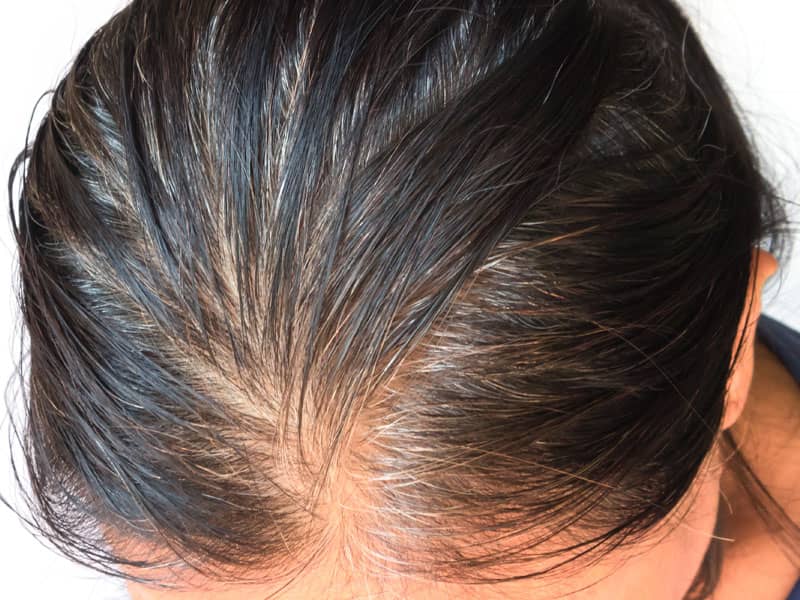Women’s Hair Loss

Dihydrotestosterone (DHT), a derivative of the male hormone testosterone, is the enemy of hair follicles on your head. Simply put, under certain conditions DHT wants those follicles dead. This simple action is at the root of many kinds of hair loss, so we’ll address it first.
Androgenetic alopecia, commonly called male or female pattern baldness, was only partially understood until the last few decades. For many years, scientists thought that androgenetic alopecia was caused by the predominance of the male sex hormone, testosterone, which women also have in trace amounts under normal conditions. Whilst testosterone is at the core of the balding process, DHT is thought to be the main culprit.
Testosterone converts to DHT with the aid of the enzyme Type II 5-alpha reductase, which is held in a hair follicle’s oil glands. Scientists now believe that it’s not the amount of circulating testosterone that’s the problem but the level of DHT binding to receptors in scalp follicles. DHT shrinks hair follicles, making it impossible for healthy hair to survive.
The hormonal process of testosterone converting to DHT, which then harms hair follicles, happens in both men and women. Under normal conditions, women have a minute fraction of the level of testosterone that men have, but even a lower level can cause DHT-triggered hair loss in women; and certainly when those levels rise, DHT is even more of a problem. Those levels can rise and still be within what doctors consider "normal" on a blood test, even though they are high enough to cause a problem. The levels may not rise at all and still be a problem if you have the kind of body chemistry that is overly sensitive to even it’s regular levels of chemicals, including hormones.
Since hormones operate in the healthiest manner when they are in a delicate balance, the androgens, as male hormones are called, do not need to be raised to trigger a problem. Their counterpart female hormones, when lowered, give an edge to these androgens, such as DHT. Such an imbalance can also cause problems, including hair loss.
Hormones are cyclical. Testosterone levels in some men drop by 10 percent each decade after thirty. Women’s hormone levels decline as menopause approaches and drop sharply during menopause and beyond. The cyclic nature of both our hair and hormones is one reason hair loss can increase in the short term, even when you are experiencing a long-term slowdown of hair loss (and a long-term increase in hair growth) while on a treatment that controls hair loss.
Telogen Effluvium
Telogen Effluvium is caused by more hairs than normal going into the shedding transitional phase (Catagen) and staying in the resting phase (Telogen). It is not known exactly what causes this but child birth, severe infection, major surgery and traumatic events are likely triggers.
Alopecia Areata
Alopecia Areata can affect both men and women of all ages and is an autoimmune problem, which results in the body wrongly believing the hair follicles in a certain area do not belong and expels the hair. This is usually seen in circular patches usually around 2-4cms. The condition is usually temporary and around 70% of patients will regain the lost hair within 2 years.
Traction Alopecia
This is caused by trauma to the hair follicle from styling. Braiding, cornrows, hair extensions and even tight ponytails can cause damage to follicles.
Chemicals & Heat
When hair is exposed to chemical treatments such as dyes, bleaches and perming solutions it can strip protein from the hair and deplete nutrients making it weak, brittle and liable to break off. The texture of the hair is also damaged, making it very dry. Straightening and excessive heat can have a similar effect.
If the trauma is too great and burns occur it can lead to a condition known as cicatricial alopecia which is commonly categorised as "scarring" alopecia. If this happens it is not possible to re-grow the hair.
Get in touch
with us today
to book your
free consultation
Cork (021) 4552424
Waterford (051) 325950

 Cork 2 Camden Pl, Patrick’s Bridge, Cork. T23 YTD4
Cork 2 Camden Pl, Patrick’s Bridge, Cork. T23 YTD4 
